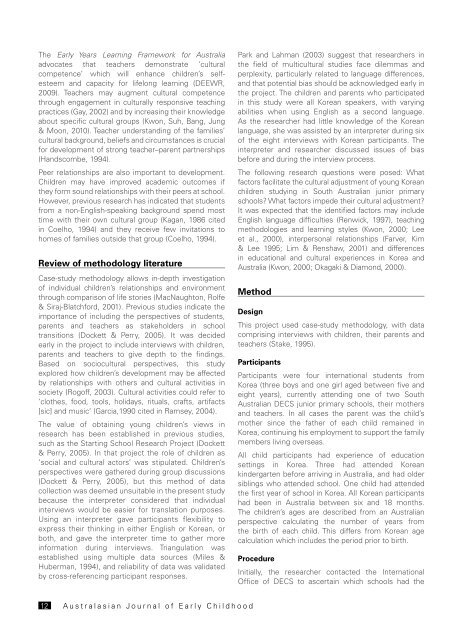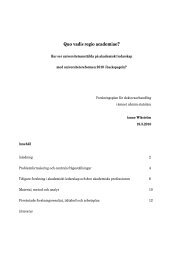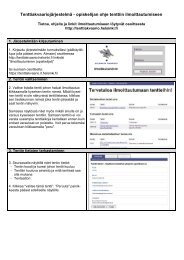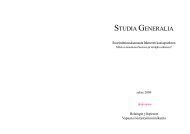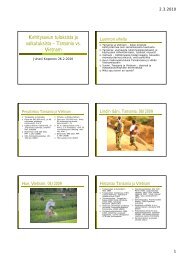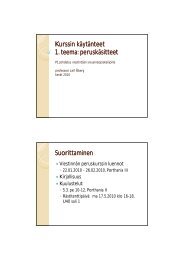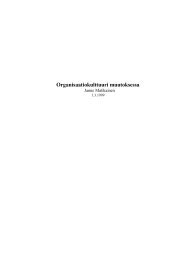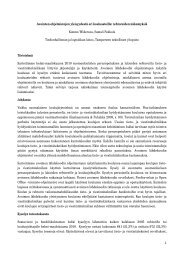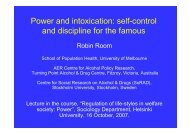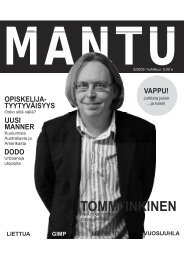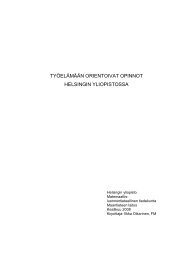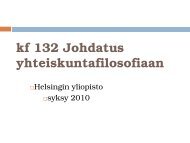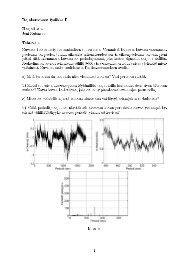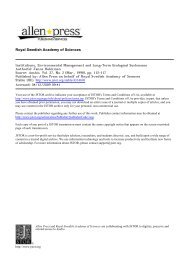The <strong>Early</strong> Years Learning Framework for Australiaadvocates that teachers demonstrate ‘culturalcompetence’ which will enhance children’s selfesteemand capacity for lifelong learning (DEEWR,2009). Teachers may augment cultural competencethrough engagement in culturally responsive teachingpractices (Gay, 2002) and by increasing their knowledgeabout specific cultural groups (Kwon, Suh, Bang, Jung& Moon, 2010). Teacher understanding <strong>of</strong> the families’cultural background, beliefs and circumstances is crucialfor development <strong>of</strong> strong teacher–parent partnerships(Handscombe, 1994).Peer relationships are also important to development.Children may have improved academic outcomes ifthey form sound relationships with their peers at school.However, previous research has indicated that studentsfrom a non-English-speaking background spend mosttime with their own cultural group (Kagan, 1986 citedin Coelho, 1994) and they receive few invitations tohomes <strong>of</strong> families outside that group (Coelho, 1994).Review <strong>of</strong> methodology literatureCase-study methodology allows in-depth investigation<strong>of</strong> individual children’s relationships and environmentthrough comparison <strong>of</strong> life stories (MacNaughton, Rolfe& Siraj-Blatchford, 2001). Previous studies indicate theimportance <strong>of</strong> including the perspectives <strong>of</strong> students,parents and teachers as stakeholders in schooltransitions (Dockett & Perry, 2005). It was decidedearly in the project to include interviews with children,parents and teachers to give depth to the findings.Based on sociocultural perspectives, this studyexplored how children’s development may be affectedby relationships with others and cultural activities insociety (Rog<strong>of</strong>f, 2003). Cultural activities could refer to‘clothes, food, tools, holidays, rituals, crafts, artifacts[sic] and music’ (Garcia,1990 cited in Ramsey, 2004).The value <strong>of</strong> obtaining young children’s views inresearch has been established in previous studies,such as the Starting School Research Project (Dockett& Perry, 2005). In that project the role <strong>of</strong> children as‘social and cultural actors’ was stipulated. Children’sperspectives were gathered during group discussions(Dockett & Perry, 2005), but this method <strong>of</strong> datacollection was deemed unsuitable in the present studybecause the interpreter considered that individualinterviews would be easier for translation purposes.Using an interpreter gave participants flexibility toexpress their thinking in either English or Korean, orboth, and gave the interpreter time to gather moreinformation during interviews. Triangulation wasestablished using multiple data sources (Miles &Huberman, 1994), and reliability <strong>of</strong> data was validatedby cross-referencing participant responses.Park and Lahman (2003) suggest that researchers inthe field <strong>of</strong> multicultural studies face dilemmas andperplexity, particularly related to language differences,and that potential bias should be acknowledged early inthe project. The children and parents who participatedin this study were all Korean speakers, with varyingabilities when using English as a second language.As the researcher had little knowledge <strong>of</strong> the Koreanlanguage, she was assisted by an interpreter during six<strong>of</strong> the eight interviews with Korean participants. Theinterpreter and researcher discussed issues <strong>of</strong> biasbefore and during the interview process.The following research questions were posed: Whatfactors facilitate the cultural adjustment <strong>of</strong> young Koreanchildren studying in South Australian junior primaryschools? What factors impede their cultural adjustment?It was expected that the identified factors may includeEnglish language difficulties (Renwick, 1997), teachingmethodologies and learning styles (Kwon, 2000; Leeet al., 2000), interpersonal relationships (Farver, Kim& Lee 1995; Lim & Renshaw, 2001) and differencesin educational and cultural experiences in Korea andAustralia (Kwon, 2000; Okagaki & Diamond, 2000).MethodDesignThis project used case-study methodology, with datacomprising interviews with children, their parents andteachers (Stake, 1995).ParticipantsParticipants were four international students fromKorea (three boys and one girl aged between five andeight years), currently attending one <strong>of</strong> two SouthAustralian DECS junior primary schools, their mothersand teachers. In all cases the parent was the child’smother since the father <strong>of</strong> each child remained inKorea, continuing his employment to support the familymembers living overseas.All child participants had experience <strong>of</strong> educationsettings in Korea. Three had attended Koreankindergarten before arriving in Australia, and had oldersiblings who attended school. One child had attendedthe first year <strong>of</strong> school in Korea. All Korean participantshad been in Australia between six and 18 months.The children’s ages are described from an Australianperspective calculating the number <strong>of</strong> years fromthe birth <strong>of</strong> each child. This differs from Korean agecalculation which includes the period prior to birth.ProcedureInitially, the researcher contacted the InternationalOffice <strong>of</strong> DECS to ascertain which schools had the12A u s t r a l a s i a n J o u r n a l o f E a r l y C h i l d h o o d
most Korean international students. Four schools wereidentified. Principals at the schools were contacted andpotential participants identified at one school (purposivesampling). After initial interviews were concluded, asecond site was included to increase the sample size.The principal at this school approved inclusion <strong>of</strong> afamily suggested by the Korean interpreter.Information letters about the project and consentforms were translated into Korean and copies madein both Korean and English. It is the researcher’sunderstanding that Koreans place great importance onformal processes, so the forms were sent home withthe children in personally addressed envelopes. After afew days, the Bilingual School Support Officer (BSSO)asked older siblings <strong>of</strong> potential participants to remindtheir parents about returning the consent forms. Theclass teacher <strong>of</strong> each child was also provided with aninformation letter and consent form.Participants were given opportunities to share theirpersonal experiences and perceptions throughsemi-structured interviews. Interviews took placeover a period <strong>of</strong> approximately six weeks. Individualinterviews were conducted by the researcher withassistance from a Korean interpreter. The interpreterwas born in Korea but had been living in Australia for 15years. The child interviews were conducted in English,with minimal additional explanation provided in Korean.Parent interviews generally involved considerableverbal interpretation. Interviews took place either atthe school or the home <strong>of</strong> the participant, dependingon parental preference. There were many discussionsbetween the researcher and interpreter, during andafter each interview, regarding the content and intent <strong>of</strong>the Korean mothers’ statements. During each interviewthe researcher and interpreter regularly clarified themeaning <strong>of</strong> the vocabulary used.To identify factors affecting Korean children’s culturaladjustment, data were obtained through posing issueoriented,open-ended questions, recorded in the form<strong>of</strong> field notes. During preliminary discussion with theKorean BSSO and school principal it was decided torecord interviews in note form to reduce potentialparticipant discomfort.To establish relationships with the children beforebeginning the interview process (Miles & Huberman,1994) the researcher visited the children’s classroomsseveral times. The child interviews were conducted inthe presence <strong>of</strong> either a member <strong>of</strong> the school staffor the child’s mother. Two child interviewees requiredsome translation. Using the interview schedule, theresearcher asked questions regarding language skillsand experiences the child found positive or challengingat school in Australia. For example, ‘What has beeneasy for you at school in Australia?’ and ‘What has beenchallenging for you at school in Australia?’ Secondaryquestions were used to gain insight about learning inan English-speaking classroom, social conventions andrelationships. The interviewer posed questions such as,‘Are you finding it easy to understand what is happeningin an English-speaking classroom? and ‘What are thedifferences you have noticed between living in Australiaand living in Korea?’ These interviews lasted approximately10 minutes. The children participated willingly.The parent interviews focused on the same topics asthe child interviews but required parents to commenton their observations <strong>of</strong> the child’s experiences. Firsta question was posed in English and then translatedinto Korean. The answer was translated back intoEnglish and notes taken. In some cases, the interpreterexpanded questions to help the participant morefully understand what was being asked. The mothersappeared open and candid. Through smiles and nodsthey demonstrated enjoyment at having the opportunityto converse about their children in Korean. Each parentinterview lasted for approximately 45 minutes.Teacher interviews required the participant to comment ontheir observations <strong>of</strong> the child’s experiences. The teachersanswered using their observations <strong>of</strong> the focus child in theclassroom and playground. Teacher interviews focused onchildren’s attributes, such as speech and language, socialskills and perceptual-cognitive understanding.Data analysisData were ordered to make possible comparisonbetween child, parent and teacher responses toquestions. Sets <strong>of</strong> responses from each <strong>of</strong> the threegroups were displayed in four tables. Data were thenanalysed by classifying common themes evident ineach case and from the three data sources. Patternsand similarities among individual perceptions wereidentified (Miles & Huberman, 1994).ResultsThe results are presented as individual cases socommon responses connecting participant groups,relevant to the research questions, can be presented,compared and contrasted. For ease in reading, fictitiousKorean names have been assigned to each child.Case 1Kyung Min was a seven-year-old Year Two girl. Shehad been in Australia for nine months and was livingwith her mother and two siblings. She had attendedkindergarten and one year <strong>of</strong> school in Korea. KyungMin spoke English confidently and said she had beenable to ‘cope’ with English when she first arrived. Shesaid she liked going to school and had found makingfriends easy; she had two special friends in her class,one Korean and one Australian.Vo l u m e 3 6 N u m b e r 3 S e p t e m b e r 2 011 13
- Page 3 and 4: 1.5 Display, download or print the
- Page 5 and 6: Volume 36 Number 3 September 2011Jo
- Page 7 and 8: Curriculum guidelines for early lit
- Page 9 and 10: ■■Know that print carries meani
- Page 14 and 15: Korean children’s cultural adjust
- Page 18: Kyung Min said listening in class w
- Page 21 and 22: immediately impact on children’s
- Page 23 and 24: Child participation in the early ye
- Page 25 and 26: their kindergarten day. A study by
- Page 27 and 28: the overall organisation, routines,
- Page 29 and 30: Council of Australian Governments (
- Page 31: Learning to measure length in the f
- Page 34 and 35: ■■a 40-minute, one-on-one inter
- Page 36 and 37: ■■72 per cent of the project sc
- Page 38 and 39: In other words, the difficulties th
- Page 40 and 41: An analysis of New Zealand’s chan
- Page 42 and 43: Before five also gave equivalent st
- Page 44 and 45: some evidence that curriculum effec
- Page 46 and 47: achievement; aiding transition to s
- Page 49 and 50: ‘It’s a mystery!’A case study
- Page 51: analysis of discourse the children
- Page 56 and 57: ange of objects on the floor (such
- Page 58 and 59: Observation and recording informati
- Page 60 and 61: ‘I’m making it different to the
- Page 62 and 63: Purpose and theoretical frameworkIn
- Page 64 and 65: The fingers were reaching out acros
- Page 66 and 67:
Figure 7. ‘I take this lovely lad
- Page 68 and 69:
Here, Rachel used substitution to r
- Page 70:
Evaluating the feasibility, effecti
- Page 73 and 74:
Table 2. Descriptive characteristic
- Page 75 and 76:
The children in this study were fro
- Page 77 and 78:
Vol. 36 No. 3 September 2011Austral
- Page 79 and 80:
implement the curriculum effectivel
- Page 81 and 82:
Table 2. Mean differences between H
- Page 83 and 84:
can be regarded as one of the infor
- Page 85 and 86:
Ganser, T. (2000). An ambitious vis
- Page 87 and 88:
(Buckhalt et al., 2009). Reduced qu
- Page 89 and 90:
invited families having difficulty
- Page 91 and 92:
Table 3. Mean hours of mother and f
- Page 93 and 94:
A reduction in night wakings might
- Page 95 and 96:
A preliminary exploration of childr
- Page 97 and 98:
adult support necessary for its eff
- Page 99 and 100:
Children’s cortisol and alpha-amy
- Page 102 and 103:
Connor, C., Son, S.-H., Hindman, A.
- Page 104 and 105:
Equity of access:Requirements of In
- Page 106 and 107:
excursions, which have been reporte
- Page 108 and 109:
We need a bus but we also need a st
- Page 110 and 111:
Appropriate child careIndigenous fa
- Page 112 and 113:
Australian Institute of Health and
- Page 114 and 115:
The Mosaic Approach relies on child
- Page 116 and 117:
participants (Altrichter, Posch, &
- Page 118 and 119:
distance. This involved trying to b
- Page 120 and 121:
Dockett, S., & Perry, B. (2003). Ch
- Page 122 and 123:
experiences (Bandura, 1997). Belief
- Page 124 and 125:
the curriculum while on their profe
- Page 126 and 127:
Exploring and evaluating levels of
- Page 128 and 129:
Level 2: Attending to feelingsThis
- Page 130 and 131:
This process to ensure coder stabil
- Page 132 and 133:
DiscussionStructured reflective pro
- Page 134 and 135:
Rock, T. C., & Levin, B. B. (2002).
- Page 136 and 137:
issues encountered in their caring
- Page 138 and 139:
pertaining to the impact and suppor
- Page 140 and 141:
Parents felt the policies involving
- Page 142 and 143:
and access suitable carers because
- Page 144 and 145:
Ievers, C. E., & Drotar, D. (1996).
- Page 146:
www.earlychildhoodaustralia.org.auE


